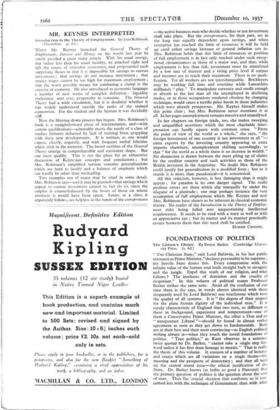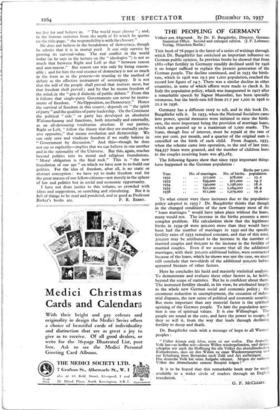FOUNDATIONS OF POLITICS
The Citizen's Choice. By Ernest Barker. (Cambridge Univer-
sity Press. .75. 6d.) _
"THE Christian State," said Lord Baldwin, in his last public utterance as Prime Minister, "declares personality to be supreme; the Servile State denies this. Every compromise with the infinite value of the human soul leads straight back to savagery and the jungle. Eirpel this truth of our religion, and what follows ? The insolence of dominion and the cruelty of despotism." In this volume of political essays Professor Barker strikes the same note. Amid all the confusion of our time there is (he says, in words almost identical with those frequently used by Lord Baldwin) one touchstone which tests the quality of all systems. It is "the degree of their respect for the plain human dignity of the individual man." It is surely characteristic of England that two men, so different as these in background, experience and temperament—one of them a Conservative Prime Minister, the other a Don and an "unrepentant Liberal "—should be found in. almost verbal agreement as soon as they get down to fiindainentals. Both are at their best and their moit convincing—as English political writing always is—when they touch the moral foundations of politics. "True politics," as Kant observes in a sentence twice quoted by Dr. Barker, "cannot take a single step for- ward unless it has first done homage to morals." That is reall the thesis of this volume. It consists of rt number of. lectures and essays which are all variations on a single theme—the meaning and the prospects of democracy ; and they all turn
. ,
on the central moral issue—the ethical justification of the State. Dr. Barker knows (as befits so good a Platonist) that the primary question of politics is the question about the soul Of man. This the 'crucial °decision that- Confronts us is".con- cem.ed nf_Government than _what
we live for and believe in. " The world must choose " ; and, in the famous sentence from the myth of Er which he quotes on the tide-page," the responsibility is with the chooser."
He does not believe in the breakdown of democracy, though he admits that it is in mortal peril. It can only survive by proving its survival-value. The real conflict in the world today (as he says in the lecture on the "ideologies ") is not so much that between Right and Left as that "between reason and anti-reason." But reason can win only by being reason- able ; and for him the real essence of democracy is not so much in the form as in the process—in trusting to the method of debate as the effective instrument of sovereignty. It is not that the will of the people shall prevail that matters most, but that freedom shall prevail ; and by that he means freedom of the mind, in the " grat d dialectic.of public debate." From this it follows that single-party Governments can never be instru- ments of freedom. "No Opposition, no Democracy." Hence the survival of freedom in this country depends on "the spirit of party "and the qualities of party leadership. On the Continent the political " side " or party has developed an absolutist Weltanschauung and functions, both internally and externally, as an all-devouring totalitarian absolute. If our parties, Right or Left, "follow the theory that they are mutually exclu- sive opposites," that means revolution and dictatorship. We can only save and vindicate freedom if we really believe in "Government by discussion." And this—though he does not say so explicitly—implies that we can believe in one another and in the rationality of the Universe. But this, again, reaches beyond politics into its moral and religious foundations. "Moral obligation is the final rock." This is "the new foundation of our age " on which we have now to re-build our politics. For the idea of freedom, after all, is no static or abstract conception : we have yet to make freedom real for the great masses of our fellow-citizens—not merely in the sphere of law and politics but in social and economic opportunity.
I have not done justice to this volume, so crowded with ideas and suggestions, so searching and stimulating. But it is full of things to be read and pondered, and as good as Professor























































 Previous page
Previous page